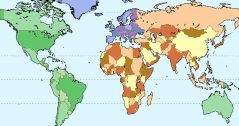|
|
| COMPANIES |
Discover the reality of companies and brands!
|
| TRANSNATIONALE.ORG |
| Free and independant information on large corporations |
Home >HaitiEconomy, tax incentives & labor conditionsThe CODEVI (Industrial Development Company) free trade zone was set up in Ouanaminthe, on the border with the Dominican Republic, under the management of the clothing group Grupo M in August 2003. The company, based in the Dominican Republic, built the plant using a $20 million loan from the International Finance Corporation (IFC) - the World Bank’s private sector lending arm. The loan was conditional on the company’s respect for freedom of association and the right to collective bargaining. However, workers’ rights were regularly abused and attempts to form a union met with dismissals, including the mass dismissal of 350 workers in June 2004.
In practice, the right to organise and collective bargaining are virtually non-existent. As a result of political chaos, a climate of violence, record unemployment rate and the complicity of a weak State, employers have enjoyed absolute freedom. In most cases, employers set wages unilaterally. Working conditions are generally disgraceful and do not meet sanitary and safety standards. On the pretext that Haitians are willing to work at any price, employers regularly behave abusively by making general reductions in wages and even ignoring the minimum wage enshrined in national legislation. Many workers are employed without contracts and are unaware of the existence of the Labour Code. Occasionally, workers do not even know the name of the company they are working for and so are unable to protect their rights. As a result, those people trying to organise workers in a union are constantly harassed or dismissed, generally in breach of labour legislation. To prevent workers from joining unions, employers give bonuses to those who are not union members.
The five industrial parks in and around the Haitian capital strongly resemble the majority of EPZs in the Americas in terms of trade union rights. The only real difference is their name and the fact that they offer investors few fiscal incentives. Trade unions are not welcome and organisers face intimidation. The garment workers, mainly women aged 25 to 35, are pushed by poverty into accepting wages of between €2 and €3.50 a day, three times lower than in the neighbouring Dominican Republic.
Minimum wage noted (US$/day)
2000 3 US$/day at/for Marnier-Lapostolle |
translate this page in arabic chinese dutch german japanese korean russian
Legal notice © T&C 1999-2010
| CONTRIBUTIONS |

